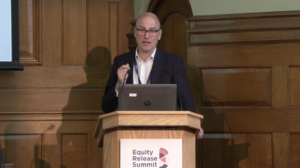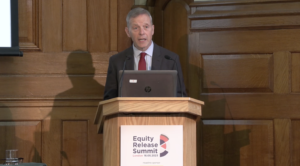UK’s Equity Release Summit emphasises commitment to transforming older customers’ lives

The UK’s Equity Release Summit, hosted by the UK Equity Release Council, kicked off its 2023 edition at Church House in Westminster on 16 May. The Summit brought together industry leaders from the UK and beyond, with participants including EPPARG members from across Europe as well as representatives from the US, Canada, Australia and South Africa.
The Summit was composed of a series of plenary sessions and industry breakout sessions covering a wide range of topics facing the equity release industry, such as green equity release, later life lending, understanding ageing consumers and their needs, mitigation of green risk and the role of automated pricing among others.
Opening the Summit, David Burrowes, Chairman of the UK’s Equity Release Council (ERC), welcomed guests not only from the UK from a range of countries including Australia, Spain, the US, France, Sweden, the Netherlands, Poland, Ireland, Italy, Germany, Norway, Canada and South Africa.
Equity release is a key tool in the box for later life financial planners
Commenting on the reason why the Summit is attracting interest, David Burrowes pointed to the “growing realisation that equity release is a key tool in the box for later life financial planners and also policy makers grappling with the big questions being asked.” He saw that the key questions were: “How do we help people to live well in later life? How do we support older consumers’ choice, flexibility, security and dignity?”
He highlighted that equity release is an important part of the answer, since “the UK’s ageing population needs to safely access property wealth to make better later life living standards a reality”. He noted that since 1991, when the ERC’s standards were launched by its predecessor, 640,000 older people had accessed £45 billion pounds in property wealth to become more financially secure, meeting their families’ needs and aspirations. He also recalled the wider benefits for the economy, “not least with 80,000 jobs, and for every pound of ER £2.12 in gross value is supported across the UK economy”.
“Since the last Summit we have continued, as a Council, with your support, to build a modern equity release sector with robust standards at its heart that are fit for purpose. In the last decade we have grown from less than £1 billion to last year lending more than £6 bn,” he added.
He also noted that the ERC had introduced a new product safeguard that enables all new customers to make penalty-free overpayments, which was “so important in a high rate environment”, and was supporting members in complying with the consumer duty. He emphasised that the Council was looking at where they wanted to be in the next 30 or so years, so the later life lending market can reach its own potential. Overall, he saw that the industry had gathered for the Summit as they were genuinely committed to transforming older customers’ lives.
Property wealth in equity has the ability to support many massive challenges facing the UK
Matt McGill, Equity Release Director at Aviva, highlighted that Aviva has been active in equity release for 25 years, and has helped more than 280,000 customers release £10.8 bn of equity from £48 bn of housing wealth. He noted that the industry has got challenges since equity release has a poor perception amongst many. He stated that he reviews complaints each week and saw that “the number of children as customers that refuse to believe their parents took out a product shows how far we still have to go”.

He underlined that public understanding of what equity release is, why and when you should take it out, “isn’t where we want it to be”. He also noted that there had been a 54% drop in lending in Q1 which meant that customers are unable to get the rates and LTVs they require. He saw that this led to a strain on business models, with funders making a “quick shift” to alternative assets. He saw that the public and industry were “eagerly waiting the return of stability in the global and UK economies”.
On the plus side, he saw that customer needs still exist, since the state pension was only providing a basic level of income, and that almost 1 in 5 of those aged 55+ have less than £1000 in savings. He asserted that “property wealth in equity has the ability to support many massive challenges facing the UK”, whether in terms of retirement income, social care, supporting the next generation or environmental upgrades. He concluded that the industry should be optimistic about the future, since equity release has a purpose, and that the industry had “an opportunity and responsibility to rise and meet this purpose”. He stated that Aviva was committed to playing its part and thanked the Equity Release Council for its leadership in the industry.

Government should engage with business and work with the industry
Matt Rodda MP, Labour MP and Shadow Minister for Pensions, commented that his party saw that it was very important to work with the pensions industry and wider financial services industry since “the country faces an unprecedented cost of living crisis and a period of very low growth”.
As a potential future government, he emphasised that for his party it was “very important that we engage with business and work in partnership with business”. He noted that the party was now going through a policy review process and he asked people to raise issues with him to take them back to shadow ministers who cover equity release.

He recalled that pensions had undergone quite a considerable change in recent years, with defined benefit replaced by defined contribution schemes, with many people now having access to workplace pensions for the first time. He noted that the current government had introduced some pensions freedoms that they recognised, and also referred to mid-life MOTs. He said they had been calling on the government to do more to help pensioners and also to ensure better administration of the state pension. In terms of the future horizon, he also pointed to the need for greater green investments and the need to avoid scams. He thought it was important for government to engage with business and work with the industry, so people should be able to look forward to a decent retirement. Above all, he thought that as a potential government it was very important for them to discuss with the industry.